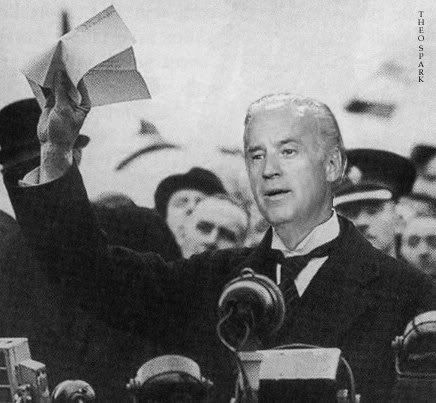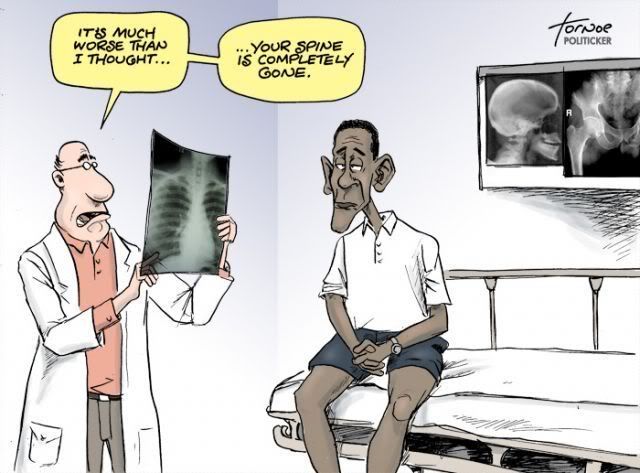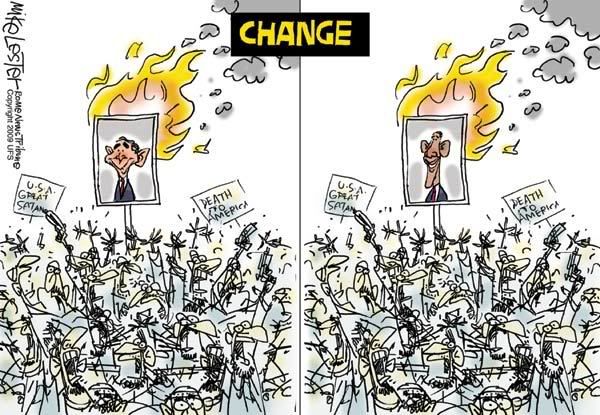
Posted on 02/07/2009 9:52:45 PM PST by Free ThinkerNY
MUNICH, Germany – Vice President Joe Biden promised a sharp break from the go-it-alone policies of the Bush era in a major speech on Saturday, saying it was time to "reset" Washington's ties with Russia and talk to Iran.
Speaking at the Munich Security Conference in Germany, an annual gathering of leaders and defense experts, Biden said the new U.S. administration of President Barack Obama was determined to "set a new tone" in Washington and with its allies.
In the wide-ranging 25-minute address, Biden focused on relations with Moscow, badly strained by Russia's brief war last year with Georgia and U.S. plans to put a missile shield in central Europe.
(Excerpt) Read more at newsmax.com ...

"Stand up Chuck!" (Rimshot)
Keep talkin’ Joe, by the time you and Oboe are done, they’ll be talking about Bush on Mt. Rushmore.
Oh, I like that...MoJo and Oboe.
Um... duh.
It's been over for 17 days Joe. Tell your boss to quit campaigning and act like the President of the United States.
Obama’s “New” Foreign Policy = Groveling and Boot Licking
You might like this.
Biden Being Biden [Yuval Levin]
I think my favorite moment in Vice President Biden’s characteristically peculiar performance before the House Democrats’ retreat this morning is when, having traipsed absent-mindedly into a discussion of his concern about the deficit, he seems suddenly to realize that he’s talking to a group that just voted to vastly increase the deficit, and the shifting of gears almost breaks the transmission:
Anybody remember a time when we're talking about, if we don't make some real changes, deficits that are a trillion two hundred billion dollars a year for as far as the eye can see, if we don't, ah, get it right, which you guys have already?
Or maybe it’s when after about twenty minutes he begins to turn to his actual prepared remarks, which are about foreign policy, but before doing so announces that he has strong opinions but doesn’t really know much:
But let me move for a second to what I was supposed to talk about. I was asked to talk about foreign policy. You know that old joke, you know, an expert is anyone from out of town with a briefcase? I'm out of town, but I don't have a briefcase, and I know a lot of you know as much and more about foreign policy as I do, but it's like that old joke, I hope you Texans aren't offended, but in Delaware that old joke about the Texan who said ‘I don't now much about art but I know what I like?’ Well, I may not know much about it, but I know what I think, and I know what I think we have to do.
Wow.
Be warned before clicking on the video, however: the speech is long and winding. As Politico put it: “During the speech, some members read newspapers or checked BlackBerrys in the warm conference room.”
http://corner.nationalreview.com/post/?q=YjJmYmVmMmZhNGE3MjlmYzA3MmQ0ZTg4MzQ5ZmFhZDE=


Mourning the end of Bush era?
Swapan Das Gupta, for The Times of India
http://timesofindia.indiatimes.com/Columnists/S_Dasgupta_End_of_Bush_era/articleshow/3995395.cms
Last week, Rahul Gandhi put his skills of persuasive politics on show by accompanying fellow media-proclaimed prime minister-in-waiting, British foreign secretary David Miliband, on a poverty tour of Amethi. The outcome was not very fulfilling for India. Stimulated, presumably, by his night out in the ‘real India’, Miliband arrived at the scene of the 26/11 outrage in Mumbai and gratuitously proclaimed that the “resolution of the dispute over Kashmir would help deny extremists in the region one of their main call to arms...” The best antidote to terror, he added, was “cooperation” and “instinctive multilateralism”.
Miliband may be complimented for his bluntness and liberal compassion but in terms of tact and sensitivity this was akin to a visiting Indian dignitary telling Londoners after the July 7, 2005 bombings that a more inclusive development of the ghettos would have helped dissipate the anger of alienated Muslim youth.
Shorn of measured prose, Miliband’s message to India from the scene of the carnage was stark: You had it coming, mate!
There are two ways of viewing Miliband’s unexpected assault on the geniality that has marked Indo-British relations since the 1990s. The first would be to link Miliband’s bleeding heart to the mundane compulsions of the Labour Party’s vote-bank politics. But courting the Mirpuri vote was a minor consideration. The greater likelihood is that decent Left-liberals are unable to distinguish between empathy and condescension. The likes of Miliband are instinctively more at ease inspecting the ‘good works’ in Amethi (he would, of course, loath the ambience of Tory-voting rural England) than soaking in the headiness of a Vibrant Gujarat meet. The hut in Amethi may have reinforced a stereotype of Third World poverty and invited patronising concern; the we-can-do-it exuberance in Ahmedabad last week, however, invoked the fearful imagery of brash Texans and sinister Russian entrepreneurs. There is an unstated but real conflict between the bleeding India of NGOs and the shining India of the productive sector. Miliband’s thesis was an expression of that irreconcilable clash.
If Miliband’s bid to bless Lashkar-e-Taiba with a nobility of purpose was purely the reflection of an individual’s derangement, it could have been viewed with a generosity due to an earnest young man out to make a mark. In the nuanced world of diplomacy it could even be offset by Prime Minister Gordon Brown’s hard-headed observation that a majority of terrorist plots in the UK had a definite Pakistan connection.
Unfortunately, a show of indulgence is unwarranted. Miliband wasn’t, after all, concerning himself with terrorism in South Asia alone. The central premise of his lecture was that the “war on terror” as defined by President George W Bush after 9/11 was “misleading and mistaken” because it conferred an artificial unity of purpose on Islamist terrorism and because it also “implied that the correct response was primarily military.” Although, he did not say so explicitly, Miliband inferred that the invasions of Afghanistan and Iraq were misadventures.
Although, it is now obligatory to abuse the outgoing US president, it is instructive to look back on 9/11 and ask whether or not the Bush response was flawed. On September 20, 2001, Bush promised Congress that “We will direct every resource at our command... to the disruption and to the defeat of the global terror networks.”
Bush walked the talk but with mixed results. His greatest achievement was in making Americans safe at home; his greatest failure was to get bogged down in a needless war in Iraq that diverted resources from the terror epicentre in Afghanistan and Pakistan.
Bush was audacious and took chances. But to Miliband, he should have responded “by championing the rule of law, not subordinating it” and built on the “solidarity between peoples and nations... based not on who we are against, but on the idea of who we are and the values we share.” Implicit is the advice to India to engage with terror rather than confront it. Yet, Miliband would have strengthened his case by specifying the values that bind the three democracies with those who idolise Osama bin Laden. Is it democracy? Religious freedom? Gender equity? Human rights?
If this is a foretaste of the Obama order, India will have reason to mourn the passing of the Bush era.
________________________________________________________________
There’s a clash, don’t deny it
The Times of India
5th Jan., 2009 | Swapan Das Gupta
Before the “public intellectual” became fashionable, academia nurtured a deep abhorrence of anything “popular”. Writing to a friend in 1950, British historian Hugh Trevor-Roper, for example, apologised for hibernating in Oxford “writing a book of infinite pedantic exactitude on a character of infinite dullness; but I must rehabilitate myself with the learned world after writing a bestseller.”
The influence on the wider public discourse by the likes of Edward Said, Henry Kissinger, and even Amartya Sen, and the glamour surrounding their interventions, may have eroded the Senior Common Room’s faith in the recondite but it hasn’t destroyed it altogether. From the publication of his celebrated (some would say, notorious) “Clash of Civilizations” in 1993 till his death on Christmas Eve, Samuel Huntington was often taunted by the charge that he was willfully playing to the galleries, abandoning scholarship for polemics, if not prejudice.
These low blows were couched in a lethal combination of envy, anger and incomprehension. Huntington was neither a soothsayer nor a prophet. He was just a Harvard don trying to make sense of the post-Cold War world. In suggesting that the contemporary world could be better understood within the framework of conflicting civilizations, Huntington was actually trying to deflate the triumphalist assumptions prevailing in the West. In his view, the spread of American “soft” power wouldn’t automatically be accompanied by the spread of liberal democracy.
“Somewhere in the Middle East”, he wrote presciently in 1993, “half-dozen young men could well be dressed in jeans, drinking Coke, listening to rap, and between their bows to Mecca, putting together a bomb to blow up an American airliner.” At that time, few people had even heard of Osama bin Laden.
After 9/11, this passage was elevated to the realms of prophecy which it was not. Huntington had just assembled disparate pieces of a puzzle and arrived at the conclusion that the Cold War had been replaced by a tussle which had the potential of turning into a big conflict.
His observations struck an immediate chord in the wider world because it corresponded to what many people instinctively felt but lacked the intellectual tools to put into a coherent framework. Huntington became a celebrity because he articulated a fear that dare not speak its name. He wasn’t advocating a global clash; he was merely pointing to its growing imminence. In denouncing him as the evil Satan, his critics were shooting the messenger.
It has become customary for politicians, international bodies and the inter-faith industry to respond to every terrorist outrage and gunfire in West Asia with the assertion that there is no “clash of civilizations”. What they actually mean is that there must not be a clash of civilizations — a noble proclamation of good intent rather than an acknowledgement of reality.
It was this willful denial that probably triggered Huntington’s final and more prescriptive book ‘Who are we?’ In his study of the American ethos, he argued that the American Creed wasn’t merely built on the US Constitution and a social ethos where opportunity and individualism reigned supreme. To Huntington, it was bolstered by a national culture built on Christianity, the English language and the Anglo-Protestant culture.
Predictably, Huntington was viciously attacked for being an American Raj Thackeray. Certainly, he was guilty of ignoring the cultures of non-European immigrants. But Huntington’s logic was different. In his view America was what it was because of its distinct intellectual inheritance. Take that away and you are still left with a US but a very different and fractured US. Such a country with a “denationalized elite” at the helm was by definition incapable of confronting the two immediate threats: militant Islam and Chinese nationalism. For the US to defend itself, Huntington said, it must first realize its national character. He could well have been speaking about Britain, and even India —infected by the plague of national ambivalence.
In intellectual and policy circles it is obligatory and fashionable to rubbish the Huntington thesis as alarmist and divisive. Yet, the epitaph of the man debunked for anticipating the barbarians at the gate will surely read: “In your mind you know he was right.”
You don’t get the nickname “Dumbest Man in the Senate” without earning it.
Translation: The era of foreign policy that keeps America safe is over.
What will happen to the One’s popularity if he is nice to the terrorist and they still blow us up? Will he be tarred and feathered? Will be be a socialist hero? Will we cling to our religion an guns even tighter?
You are cruel!
You’re right! There’s stiff competition for that title!
More like being tarred and feathered, I would think.
My brain is seizing up from reading Bumbling Biden’s noisily spouted nothingness.
“I hope you Texans aren’t offended, but in Delaware that old joke about the Texan who said ‘I don’t now much about art but I know what I like?’”
We Delawareans have little to do with Texans and does anyone really think we tell jokes about them? NJ, PA, and MD yes. But TX? I just hope Texans and the rest of the US aren’t telling jokes about Delaware BECAUSE of Biden. Biden IS our “old joke”.
In other words, they have effectively killed the Global War on Terror and have decided to roll over for our enemies, INSURING another terrorist attack. These people scare the hell out of me.
Sorry, INSURING = ASSURING.
Peace for our time.
Disclaimer: Opinions posted on Free Republic are those of the individual posters and do not necessarily represent the opinion of Free Republic or its management. All materials posted herein are protected by copyright law and the exemption for fair use of copyrighted works.